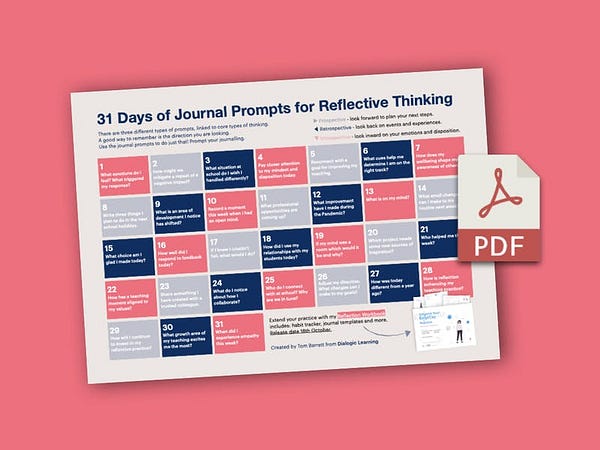Put Down Your Phone And Write
For the past few years, I’ve been documenting my reflections and experiences in a journal.

I use the Bullet Journal method, which is a simple notation system for the different entries. I like how it is forgiving and flexible, adapting to my various needs or lack of motivation.
Journals and notebooks have always been a part of my professional life, and I have plenty of volumes of scribbles, drawings and sketches.
Let’s have a look at the benefits of a habit of journaling regularly.
Benefits of reflective journaling
Journal writing is a way to get in touch with our thinking, feelings, memories and sense of self.
It can be introspective or analytical. It can also act as an aid for reflection on the past and thinking about the future. Journals provide a space to record thoughts, dreams and insights throughout different times in our lives.
Without the pressure of a more formal thinking style, I often find it easier to relate to different experiences and see the links between them.
The benefits of writing regularly about our thinking can bring about:
- An understanding of thinking patterns, both negative and positive, that we do every day.
- There is a greater sense of control because we get to choose the direction and topic/theme for each journaling session.
- Depth and flexibility of thinking.
- The act of writing itself can affect thinking patterns positively.
- There are clear links between regular journaling and increased self-awareness and understanding.
- Reflective journaling can lead to greater emotional intelligence because we become more aware of emotions, the triggers that cause them and how they affect thinking patterns.
- Journal writing enhances our introspection. It makes it easier for us to “know thyself”.
- Writing about past experiences can help us to understand how we have reacted and learnt from those situations.
- Journal writing can be a source of inspiration when future goals are being planned. It can also be a way to identify future opportunities that have been missed because we have not been attuned enough to our emotions, instincts or intuitions.
My Top 5 Journaling Tips for Getting Started

#1 — Splurge on Stationery
Educators have a secret love for new stationery. A school stationery cupboard is a special place. There is something wonderful about finding just the right pen or the quality of the heavy paper.
Use a notebook you like. It can be a simple colour, size or design that makes you feel good about writing in it every day.
My weapons of choice are a Micron 01 pen and a Leuchtterm Bullet Journal.
#2 — Keep your notebook nearby
You want to reduce the friction, so it is easy to build a habit. I keep my notebook open and with me all day, so it is easy to add and jot ideas down.
My notebook is on my bedside table too. This way, journaling can act as a “pre-sleep ritual” where you let thoughts flow freely and record them before the day is over. It is all about reflective habits and routines.
#3 — Write freely and worry less
Don’t worry about how you phrase things or what future actions you should take due to what you write. Write to express yourself first and foremost. If future opportunities or action items present themselves, that is a bonus.
Worry less about if you are doing journaling ‘right’. It is up to you.
#4 — Relax and have a biscuit
Make time for yourself every day to write in your journal. It can be at the beginning or end of each day or just as the day unfolds. Reflect on what has happened, dream about future possibilities and record insights as they appear.
Don’t worry too much about it if you find that writing is difficult after a busy day. Try again tomorrow or another time when you can relax and focus more quickly on your thoughts and feelings. I always find biscuits to help.
#5 — Don’t expect miracles
Journal writing is not a miracle cure. It has to become part of your life before you start to see the benefits. Like any ritual, it takes time to get in the habit and feel comfortable with it.
I have journals that span years because I didn’t write in them for months or think my practices were consistent. The future benefits are worth waiting for, even if you need to force yourself at the beginning!
“We must learn to ask questions, not of our future selves but of our present lives; we must ask what is the future that I am laying out for this one person called me.” ~ Annie Dillard
Your Talking Points
- What reflection framework suits your approach to journaling?
- Journaling does not need to be perfect; it only needs to happen.
- The benefits from journaling come from ongoing practice, so make it easy and flexible.
- How might your mindset or environment affect how quickly or easily you write in your journal?
31 Days of Reflective Journal Prompts

My new Reflection Workbook is available now.
Download a free copy of my 31 Days of Reflective Journal Prompts to help you build a habit of healthy thinking and compound some gains about reflective practice.
Use the link below to visit the landing page and get your download.
Download A Month of Journal Prompts
My weekly email helps educators and innovation leaders enhance their practice by sharing provocations, ideas and mental models. Join today, and get your copy this week.
